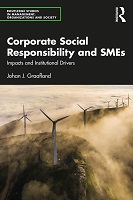Corporate Social Responsibility and SMEs
Proposal review
Impacts and Institutional Drivers
| dc.contributor.author | Graafland, Johan J. | |
| dc.date.accessioned | 2024-02-08T11:07:53Z | |
| dc.date.available | 2024-02-08T11:07:53Z | |
| dc.date.issued | 2022 | |
| dc.identifier | OCN: 1269408777 | |
| dc.identifier.uri | https://library.oapen.org/handle/20.500.12657/87581 | |
| dc.description.abstract | The world’s people and their leaders face a complex and multifaceted set of ‘eco-social questions’. As the productivity of humanity increases, the negative external environmental effects of production and consumption patterns become increasingly problematic and threaten the human welfare. As the regulating power of national and international governments is limited, this challenge has generated a strong interest in the corporate social responsibility (CSR) of companies. Firms find it increasingly important to meet the expectations of stakeholders with respect to the company’s contribution to profit, planet, and people. The primary aim of this book is to introduce the reader to the impacts and drivers of CSR, with a special focus on small and medium-sized enterprises (SMEs). Research into the social and environmental impacts of CSR is rare. This is a serious gap because if CSR were to fail to have favourable social and environmental impacts on society, the whole concept may become redundant. If societal impacts of CSR are substantial, it is important to know the drivers of CSR. This book considers (1) factors internal to the company, (2) the competitive environment of the company, (3) institutions external to the company, and (4) how the impacts of institutions are mediated or moderated by company internal factors. This book will fill this gap by estimating various types of models that integrate external and internal factors driving CSR and its impacts on environment, innovation, and reputation, making it a valuable resource for researchers, academics, and students in the fields of business management and CSR. | en_US |
| dc.language | English | en_US |
| dc.relation.ispartofseries | Routledge Studies in Management, Organizations and Society | en_US |
| dc.subject.classification | thema EDItEUR::K Economics, Finance, Business and Management::KC Economics | en_US |
| dc.subject.classification | thema EDItEUR::K Economics, Finance, Business and Management::KJ Business and Management::KJS Sales and marketing | en_US |
| dc.subject.classification | thema EDItEUR::K Economics, Finance, Business and Management::KJ Business and Management::KJQ Business mathematics and systems | en_US |
| dc.subject.classification | thema EDItEUR::K Economics, Finance, Business and Management::KJ Business and Management::KJM Management and management techniques::KJMV Management of specific areas::KJMV6 Research and development management | en_US |
| dc.subject.classification | thema EDItEUR::T Technology, Engineering, Agriculture, Industrial processes::TQ Environmental science, engineering and technology | en_US |
| dc.subject.classification | thema EDItEUR::K Economics, Finance, Business and Management::KJ Business and Management::KJM Management and management techniques::KJMV Management of specific areas::KJMV7 Sales and marketing management | en_US |
| dc.subject.classification | thema EDItEUR::K Economics, Finance, Business and Management::KJ Business and Management::KJV Ownership and organization of enterprises::KJVS Small businesses and self-employment | en_US |
| dc.subject.other | CSR;government regulation;SME;environmental policy;CSR Initiative;Price competition;CSR Policy;Business culture;Intrinsic Motivations;Women in management;Motivation Crowding Theory;Family Business;Company’s CSR;Innovation;CSR Activity;equal opportunities;Motivation Crowding;Business;Uncertainty Avoidance;Environmental impacts;Business Case;Extrinsic Motivation;Negative Relationship;Technological Competition;CSR Strategy;Innovation Motive;CSR Practice;Company Size;SME Manager;RMSEA Measure | en_US |
| dc.title | Corporate Social Responsibility and SMEs | en_US |
| dc.title.alternative | Impacts and Institutional Drivers | en_US |
| dc.type | book | |
| oapen.identifier.doi | 10.4324/9781003216483 | en_US |
| oapen.relation.isPublishedBy | 7b3c7b10-5b1e-40b3-860e-c6dd5197f0bb | en_US |
| oapen.relation.isFundedBy | f1d7f537-10c0-4ec5-b27c-18255398cb6a | en_US |
| oapen.relation.isbn | 9781003216483 | en_US |
| oapen.relation.isbn | 9781032106717 | en_US |
| oapen.relation.isbn | 9781000523256 | en_US |
| oapen.relation.isbn | 9781032106724 | en_US |
| oapen.imprint | Routledge | en_US |
| oapen.pages | 299 | en_US |
| peerreview.anonymity | Single-anonymised | |
| peerreview.id | bc80075c-96cc-4740-a9f3-a234bc2598f1 | |
| peerreview.open.review | No | |
| peerreview.publish.responsibility | Publisher | |
| peerreview.review.stage | Pre-publication | |
| peerreview.review.type | Proposal | |
| peerreview.reviewer.type | Internal editor | |
| peerreview.reviewer.type | External peer reviewer | |
| peerreview.title | Proposal review | |
| oapen.review.comments | Taylor & Francis open access titles are reviewed as a minimum at proposal stage by at least two external peer reviewers and an internal editor (additional reviews may be sought and additional content reviewed as required). |

